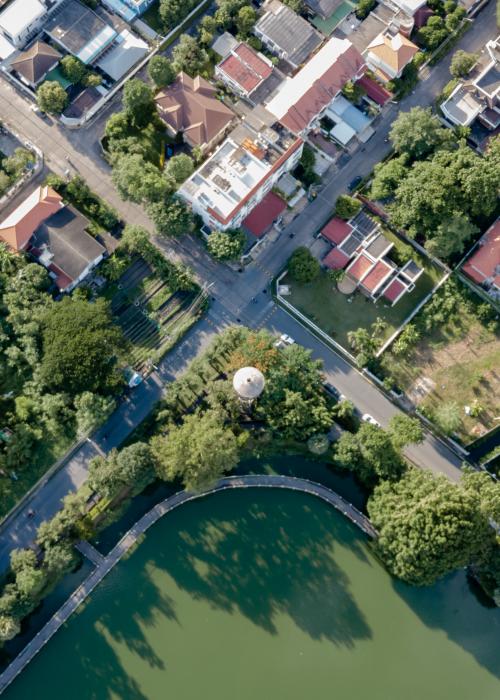
Low-Carbon and Climate-Resilient Cities
Low-Carbon and Climate-Resilient Cities Project explores urban strategies that combine climate mitigation and adaptation, to accelerate zero-carbon, climate-resilient, and inclusive urban transitions, enhance local capacities on climate emergency, and help China achieve its dual carbon goals.
Climate change poses growing threats to Chinese cities. Many cities are already deeply affected by climate impacts such as heavy precipitation, heat waves and severe droughts. Life-threatening floods are alarmingly common, with a record 21 large-scale floods in 2020. Particularly, coastal provinces, contributing more than half of China's GDP in 2019, are in peril from floods, storm surges and sea-level rise.
Meanwhile, cities are the main battleground for China to meet its carbon neutrality targets. Chinese cities contribute about 85 percent of energy-related carbon dioxide emissions; nearly 70 percent of China's population lives in cities, and that is expected to grow to 80 percent by 2050, an additional 255 million residents. The continued advancement of China's urbanization process will have a profound impact on China's energy consumption pattern, bringing challenges and opportunities for achieving the dual carbon goals.
Low-Carbon and Climate-Resilient Cities Project aims to promote an integrated approach to managing cities that address the interlinked challenges of climate risks and emissions reduction, helping cities act as an engine of China's high-quality development. WRI collaborates with local governments, think tanks, and research institutes in the fields of urban planning, climate, building, and transportation, to conduct research and provide technical assistance on low-carbon and climate-resilient urban transitions, in order to maximize the synergies between climate mitigation and adaptation. We have developed strong partnerships and collaboration with Shenzhen, Beijing, Ningbo, Chengdu, Shanghai and many other Chinese cities.
WRI helps China build Low-Carbon and Climate-Resilient Cities through:
Strategic research to illuminate the interlinked challenges of climate risks and emissions reduction and explore the development paths of low-carbon and climate-resilient cities: Our research aims to explore the co-benefits of climate mitigation and adaptation, and to enhance the awareness and understanding of governments, institutions and communities on the climate crisis, urban emissions reduction strategies and technical routes, urban resilience, urban governance, and climate-resilient infrastructure planning and financing.
On-the-ground pilots to mobilize collective actions and demonstrate pathways: We co-design and co-implement pilot projects that act as champions to demonstrate the feasibility of low-carbon and climate-resilient urban transitions with local governments, peer organizations, and communities. The pioneering practices will be scaled up to other cities at home and abroad through our strong partnerships and networks.
Evaluation methodologies and analysis tools for low-carbon and resilient development to enhance capacity: By leveraging data science, analytics, and visualization, we harness the emergence of open and novel data, develop transparent methodologies, and provide evidence-based solutions for policymakers, business leaders, and residents. We generate rigorous analyses and evaluations, to evaluate local climate action progress, weigh climate-resilient infrastructure costs and benefits, and assess climate risks and exposure of urban residents in China.
Citysphere platform to provide decision-making support for local governments and research institutes: WRI’s Citysphere platform aims to enable policymakers, planners and urban researchers to gain an in-depth understanding of the current status of low-carbon development and carbon neutrality target setting in cities, track the low-carbon progress, identify gaps in urban climate policies, and refer to the best practices of peer cities to formulate specific and effective climate plans and policies, thereby helping cities to enhance climate ambitions and accelerate low-carbon transformation.
Leveraging the advantages and expert networks of global think tank and do-tank to promote the exchange and sharing of best practices at home and abroad: As an independent global think tank and do-tank, our network of experts works in more than 150 cities across 75 countries. Leveraging the advantages of the global network, we introduce the best practices and policies on low-carbon and climate-resilient development of international cities, and summarize the experiences of Chinese cities. We encourage Chinese cities to compare with international cities, support and promote international exchanges and cooperation at the local level, and enhance the capacities of Chinese cities in low-carbon and resilient development.
.
More Related
相关平台

Citysphere
Launch PlatformLaunch Platform Visit ProjectA visualization platform that comprehensively showcases and assesses cities’ climate goals, low-carbon progress, etc. to drive cities to achieve climate ambitions and accelerate low-carbon transitions.
Part of Sustainable Cities